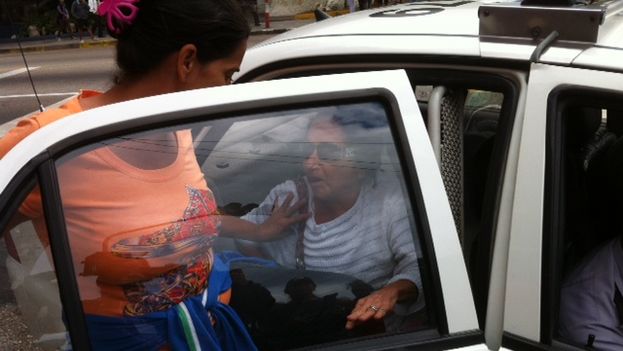
“Sit down!” ordered ‘Number One.’
“I’m comfortable like this, thanks,” I responded.
14ymedio, VICTOR ARIEL GONZALEZ, Havana, 12 December 2014 — “But you didn’t come here to be comfortable,” he concluded, and for once we were in agreement on something, Number One and I: I was not comfortable. It was Human Rights Day, which in Cuba is a sad date, and a mob of agents dressed in civilian clothes had arrested me together with other journalists as well as dozens of independent activists.
I was taken by force from the bus on which I was returning to the editorial office after taking photographs in the middle of Vedado, and also stripped of my mobile phone from which they also erased information. They put me into a patrol car that was parked at the corner of 21 and L, where they transferred me to bus full of uniformed police officers at the park at 21 and H. From there, accompanied again by plainclothes agents, they took me in a private car and I came to stop at the Aguilera station, an old barracks from the Batista police era.
Obviously, no one feels comfortable if they are trounced like that. During my trip to the Aguilera cells they held me without handcuffing me, maybe hoping for some violent reaction on my part so they could beat me up right there or later insinuate that I am one of them and therefore “they were treating me well.” That’s how these State Security guys work, mine also spoke of “accidents” that have happened because of not handcuffing arrestees. “What I am committing is a violation of procedure,” said the man next to me, in the rear seat of the Greely. True: It is a violation that unknown perpetrators kidnap a free citizen.
Returning to the scene of the interrogation, here I am next to a couple of henchmen who shared that December 10 with me. I will describe them: ‘Number One’ is older and calls himself Javier. His supposed position as lieutenant colonel was let drop by ‘Number Two,’ who had earlier identified himself as “Captain Ricardo” and is quite a bit younger.
When they brought me up to the interrogation rooms, Number Two was waiting for me, and his intervention started badly. He called me a “spoiled little boy” and “frustrated engineer.” Number One then arrived, authoritarian and even more unpleasant, his head polished by a splendid shave. “Sit down!” had been almost his first words directed to me, because the beginning phase of the choreography of the interrogation was intimidation or the attempt to establish authority.
Seeing that I would only be allowed to speak when they wanted me to, I tried to remain quiet most of the time. I wanted them to end their diatribe as soon as possible. One told me, among other things, to learn “to listen” and drop the “stobbornness” – he meant to say “stubbornness.” Number Two insisted, “You have problems, you have problems, you have problems.” The choreography was in phase two: informative-educational.
In that part of the dance Number One left the room, then entered to interrupt Number Two and then left again. The third act was when Number One interrupted his subordinate again, I don’t remember much of his discourse, and he said from the open door in a paternal and severe tone: “Your brother . . . came looking for you,” concluding with “We’re going to free you soon.”
Before describing the choreography’s fourth act, that of the threat, I find it imperative to clarify something about these guys: It is well for them to know that they do not have to “free” me, simply because I am already free. Freedom, more than walking around on a slave island and in a dilapidated city that individuals like my interrogators police and terrorize, is a state of grace.
They are less free than I because they obey orders, and because they feel the need to arrest someone who thinks differently in order to try to demonstrate that they are stronger. But it is easy to see that they are scared to death, because when they display their little borrowed power – in this country the powerful really are not they, but their bosses – they only demonstrate how startled they are that a little group of peaceful people like me think and express themselves differently.
Watch out for fear, officers, it cuts both ways. The act threat act in your interrogation served to reaffirm my conviction that there will be no going back. You will be able to threaten me and my family, but I will keep writing while I have the means.
Really, you have left me no other option. I only hope that by the next choreography you will have rehearsed your macabre dance a little more and studied the script better.
Translated by MLK
